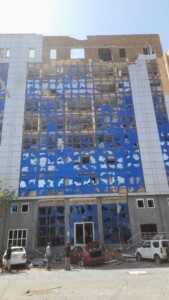Deadline for Sudan govt to respond to Beja leaders’ demands ends today
The closure of ports and highways in eastern Sudan in protest against the Eastern Sudan Track protocol in the Juba Peace Agreement entered its third week today. This evening, the deadline for the Sudanese government to decide on the cancellation of the protocol will expire.
It is not clear what will happen when the government does not comply. Yesterday, Sayed Tirik, head of the Hadendawa clan and chairman of the High Council of Beja Nazirs* and Independent Chieftains renewed his demand to cancel the Eastern Sudan Track in a speech in El Faw in El Gedaref. In addition, 50 per cent of the resources in eastern Sudan should be allocated for the benefit of Red Sea state, Kassala and El Gedaref.
 Sayed Tirik, head of the Hadendawa clan and chairman of the High Council of Beja Nazirs and Independent Chieftains (Social media)
Sayed Tirik, head of the Hadendawa clan and chairman of the High Council of Beja Nazirs and Independent Chieftains (Social media)
The closure of ports and highways in eastern Sudan in protest against the Eastern Sudan Track protocol in the Juba Peace Agreement entered its third week today. This evening, the deadline for the Sudanese government to decide on the cancellation of the protocol will expire.
It is not clear what will happen when the government does not comply. Yesterday, Sayed Tirik, head of the Hadendawa clan and chairman of the High Council of Beja Nazirs* and Independent Chieftains renewed his demand to cancel the Eastern Sudan Track in a speech in El Faw in El Gedaref. In addition, 50 per cent of the resources in eastern Sudan should be allocated for the benefit of Red Sea state, Kassala and El Gedaref.
The Beja nazirs have opposed the Eastern Sudan Track since it was agreed upon by the Sudanese government and the Sudan Revolutionary Front rebel alliance in the South Sudan capital of Juba in February 2020.
The Eastern Sudan Track was negotiated and signed by Ababda tribe leader Osama Saeed, Chairman of the Beja Congress in Opposition, and Beni Amer leader Khalid Shaweesh, Head of the Popular Front for Justice. The High Council of Beja Nazirs and Independent Chieftains was not involved in the talks. They demand the entire protocol to be cancelled and call for an inclusive eastern Sudan conference to decide on the future of the region.
El Gedaref, Shawak and El Bawadra witnessed protests against the visit of Tirik to the state. Protestors blocked roads and others organised vigils in rejection to “the racist discourse”.
‘Impossible’
Jibril Ibrahim, leader of the Justice and Equality Movement and currently Minister of Finance, responded by saying that it is impossible to nullify the Eastern Sudan Track protocol. The cancellation “of any part of the Juba Peace Agreement will lead to its complete collapse, and reduce chances to reach the security and justice for the people of eastern Sudan”.
El Hadi Idris, chairman of the Sudan Revolutionary Front (SRF, an alliance of a number of rebel factions) and member of the Sovereignty Council as well stated that it is not allowed to cancel any track or part of the peace agreement.
In a press statement on the occasion of the first anniversary of the Juba Peace Agreement yesterday, he stated that the current problems have been caused by the delay in holding an inclusive eastern Sudan conference to complete the Eastern Sudan Track Agreement.
Losses
The Ministry of Transport reported that the closure of the Red Sea state Southern Port has already cost the Sudanese treasury “large sums”. The blockades “may lead to the disruption of several procedures”.
The closures caused an accumulation of ships in the ports and trucks on the roads. Shipping companies are not shipping to Port Sudan until the problems are resolved.
The protesters did allow the passage of American wheat carriers at the port and roads, the ministry said in a press statement.
The protests actions called for by eastern Sudanese community leaders in September, including the short closure of the pipelines transporting oil from Sudan and South Sudan to Port Sudan for export, have led to the filing of a lawsuit against the nazirs. The Beja leaders are accused of undermining civil state authority, threatening the transitional period, inciting hatred, violence and tribalism, and sabotaging the national economy.
* A nazir is a state-appointed administrative chief of a tribe or clan, according to the Native Administration system in Sudan introduced by the British colonial authorities in the first quarter of the 20th century.











 and then
and then